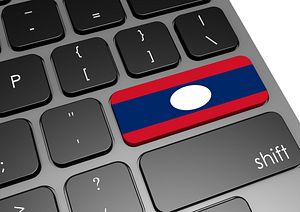The government of Laos has signed an Internet law that claims to support the growth of the Internet but actually contains numerous contradictory provisions that undermine free speech and other citizen rights. When this was reported almost two months ago, the concern of many was the broad and vague cybercrimes enumerated in the law. At the time, though, a text of the law had yet to be made public. We now have an unofficial English translation of the law and after reading the document, we can confirm that there are grounds to worry about the negative impact of the new law in media freedom and democracy in Laos.
The law has placed strict if not excessive regulations on how Internet users can share or disseminate information online. For example, article 6 recognizes the right of individuals to exchange online data but obliges website administrators “to check content before disseminating it on their web page.” This sounds impractical. The same provision states that “information which is not (approved) from official media or media offices/organizations legally cannot be used officially.” Does this mean that Lao netizens can only share news reports approved by the State?
Article 7 prohibits the creation of anonymous or pseudonymous social media accounts, instead requiring individuals to register by giving their “name, surname and current address in (compliance with official documents).” This is a blow to citizens who seek to expose wrongdoings in the government through the Internet.
Article 9 explicitly bans the posting and sharing of content that feature the following:
– Disseminating false and misleading information against the Lao People’s Revolutionary Party, undermining the peace, independence, sovereignty, unity, and prosperity of Lao PDR;
– Circulating information that encourages citizens to become involved in terrorism, murder, and social disorder;
– Supporting online campaigns that seek to divide solidarity among ethnic groups and countries;
– Spreading information that distorts the truth or tarnishes the dignity and rights of individuals, sectors, institutions or organizations;
– Sharing of comments whose content are in line with the above-mentioned prohibitions.
Based on these guidelines, it seems that legitimate criticism of government programs and policies could be interpreted as a criminal act if it creates division, confusion, or “disorder” among the public. It is not hard to see how authorities could use the law to prosecute journalists, activists, and other critics of the government.
Articles 11 and 13 require Internet service providers and website administrators to “terminate access” and “temporarily or permanently block users” who are found to be violating government decrees and other regulations. They are also expected to “cooperate and provide information” to agencies conducting investigations. Meanwhile, article 14 prohibits Internet service providers from providing assistance or opportunities to individuals, legal entities or organizations who seek to undermine the Party and government policies.
The law also identified several agencies that have been given the mandate to conduct widespread online surveillance. Article 18 empowers the Information, Culture and Tourism Sector to “monitor (follow and inspect), diagnose and analyze the Internet-based information content” of individuals, legal entities and organizations.
Article 19 gives the Public Security Sector the authority to “collect, check and analyze Internet-based information [disrupting] national stability and social security.” It can also “conduct an investigation” into individuals and organizations suspected of breaching the law.
The government believes that this kind of Internet regulation is needed. While acknowledging the positive contributions of the Internet to the local economy, Lao officials also warned that the medium can be used to cause panic in society. But the new law will obviously discourage netizens from using online forums to engage public officials and challenge public policies. It is hardly conducive to a free and open Internet. What Laos needs is a law that will encourage Internet commerce and online innovation; not something that will unfairly penalize critics, activists, and even ordinary Internet users.

































